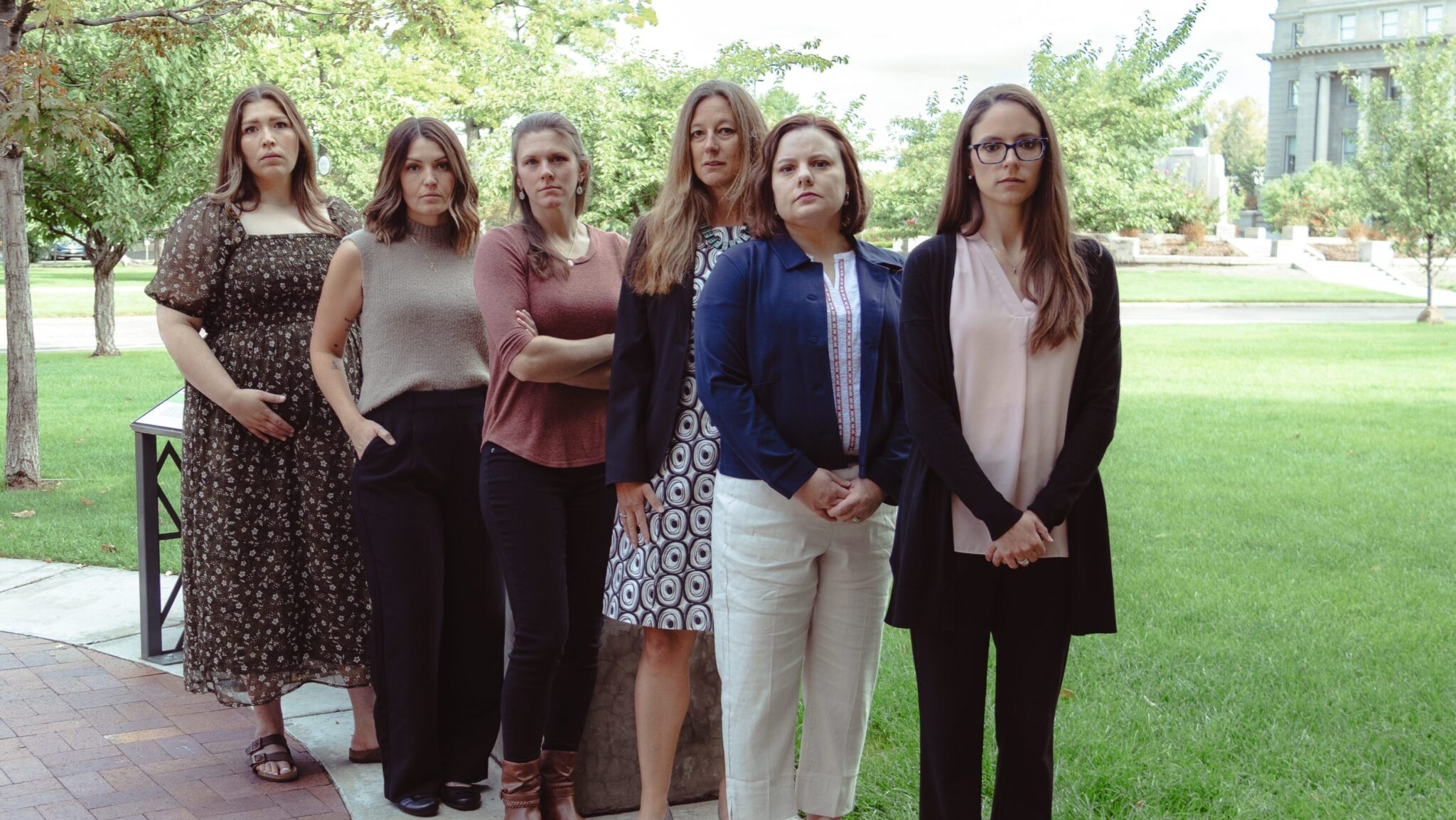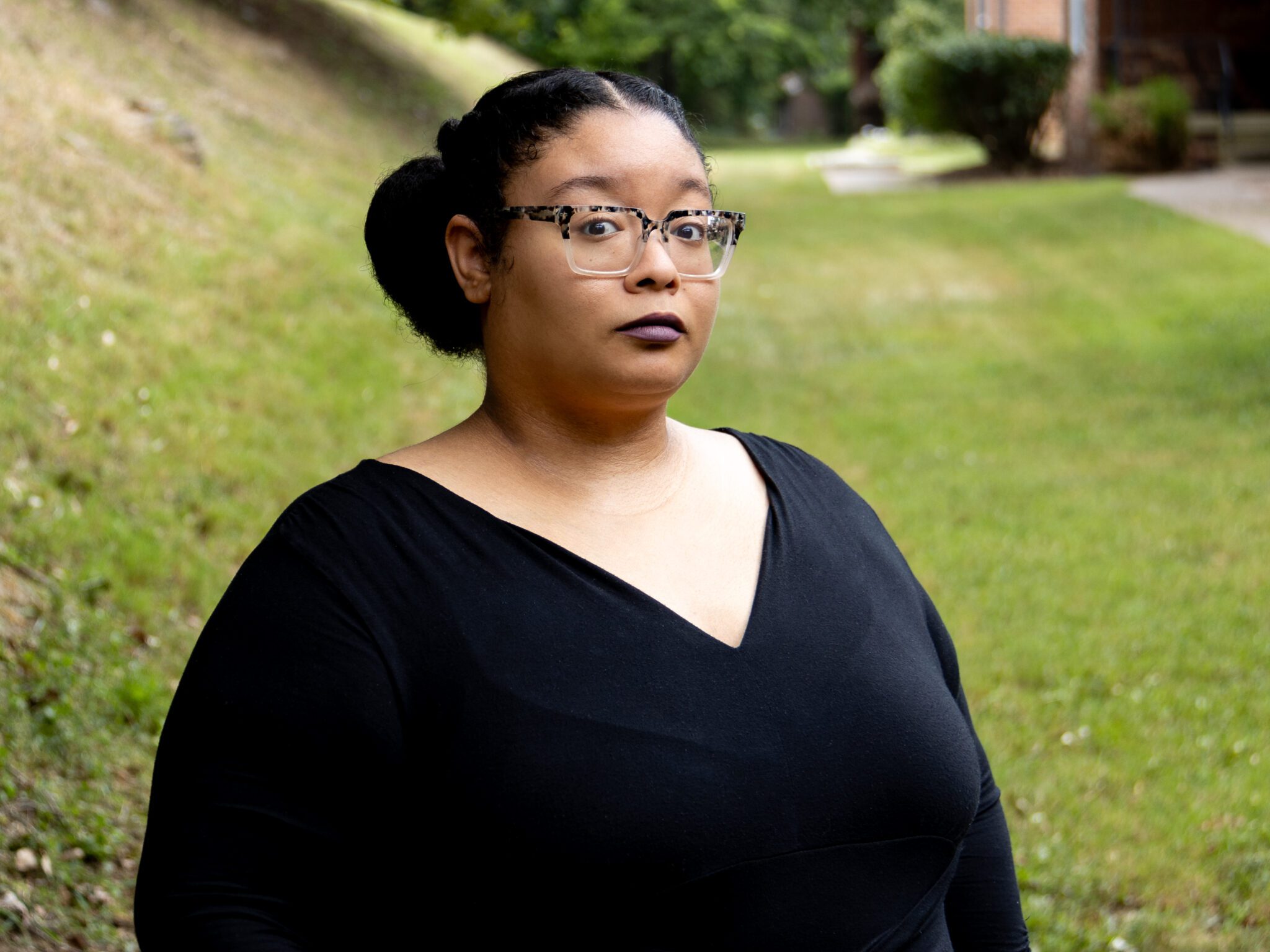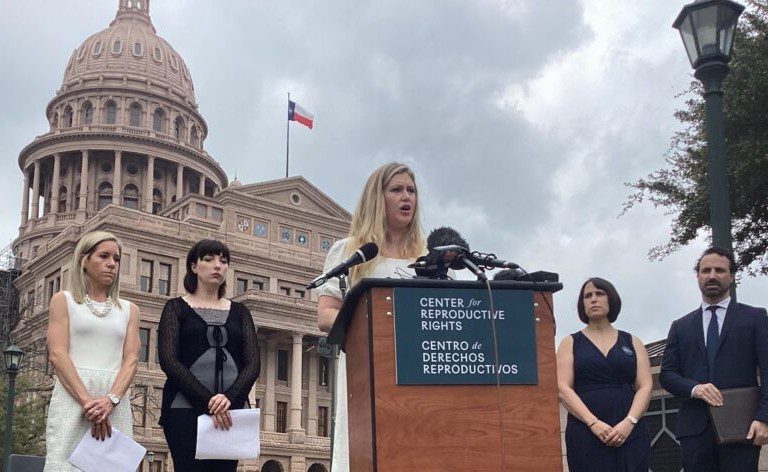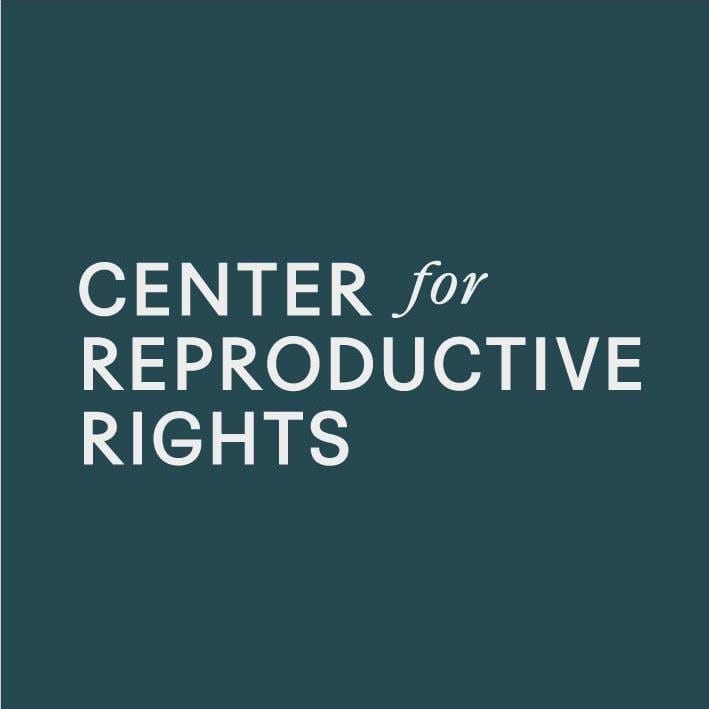Center Expands Work on Behalf of Patients Denied Abortion Care Despite Grave Pregnancy Complications
Building momentum on its case against Texas, the Center files complaints in Idaho, Tennessee and Oklahoma to ensure pregnant people in dire situations can access abortion care and doctors have clarity on “medical emergency” exceptions in their state’s abortion bans.

In March, the Center for Reproductive Rights filed the country’s first lawsuit representing women denied abortion care since the U.S. Supreme Court eliminated the constitutional right to abortion and cleared the way for states to ban it entirely.
Today, the Center expanded on that work, filing complaints in three states—Idaho, Tennessee and Oklahoma—on behalf of women denied or delayed in receiving medically necessary abortion care despite facing severe and dangerous pregnancy complications. With these actions, the Center seeks to ensure that pregnant people in such dire situations can access abortion care in these states, and that doctors are given clarity on what situations qualify under the “medical emergency” exceptions in their states’ abortion bans.
In addition to eight patient plaintiffs who were denied care, the Center is representing a local Idaho medical association and four physicians who argue they are unable to provide care to patients because the bans threaten them with harsh criminal, financial and professional penalties.
More details about the complaints:
Medical Emergency Exceptions to State Abortion Bans: Idaho, Tennessee and Oklahoma
Read more including news and media highlights, in-depth descriptions and legal arguments, a replay of the press conference, stories of the patients and doctors, and more.
Abortion is standard, necessary and life-saving procedure crucial in treating many dangerous medical conditions that arise during pregnancy. But in states that have criminalized abortion, patients facing grave pregnancy complications are being denied medically indicated abortion care—even when their health, lives and future fertility are at risk.
“The Supreme Court’s unwarranted reversal of Roe v. Wade has led repeatedly, in multiple states, to women being denied abortion care when they face serious complications in their pregnancies,” said Nancy Northup, Center president and CEO. “No one should have to be at death’s door to receive essential health care, but that is exactly what happens when doctors are forced to practice medicine under threat of imprisonment.”
The complaints filed today include:
- Idaho—Brought on behalf of four women denied abortion care, two physicians and the Idaho Academy of Family Physicians (IAFP), Adkins v. State of Idaho challenges the limited scope of the medical exceptions to Idaho’s two abortion bans. The medical exception to Idaho’s near-total ban permits abortion only to prevent death, and its six-week ban—with “vigilante”-style civil liability provisions—similarly has a narrow medical exception. Clarifying the laws’ exceptions would allow physicians to provide life-saving care without waiting for patients to be near death. The lawsuit also seeks to clarify and expand the exceptions under the two bans to ensure physicians can provide abortion care to preserve a pregnant person’s health and for cases of fatal fetal diagnoses. The case was filed in Idaho state court.
- Tennessee—Brought on behalf of three women denied abortion care and two physicians, Blackmon v. State of Tennessee challenges the limited scope of the “emergent medical condition” exception to Tennessee’s total abortion ban. Such clarification would allow physicians to provide life-saving care without waiting for patients to be near death. The lawsuit also seeks to clarify that the law’s exception permits abortion for cases of fatal fetal diagnoses. The case was filed in Tennessee state court.
- Oklahoma—In this action, the Center filed a complaint against Oklahoma Children’s Hospital, alleging it violated the Emergency Medical Treatment and Active Labor Act (EMTALA) when it denied medically indicated abortion care to a woman suffering a life-threatening pregnancy complication. The complaint under EMTALA—a federal law requiring hospital emergency departments to provide “stabilizing treatment,” which can include abortion care—was filed with the U.S. Department of Health and Human Services (HHS).
Read more.
Their Stories
Read the full stories of the women and physicians who are complainants in these three filings.
Earlier Texas Case Brought National Attention to Harms of Abortion Bans
Zurawski v. State of Texas, the Center’s earlier case brought on behalf of 13 women denied abortion care and two physicians, brought national attention to the real-life harm of extreme state abortion bans. Through riveting testimony, plaintiffs detailed their experiences, which included fighting severe infections in a struggle to stay alive, scrambling to find care out of state after learning of fatal fetal diagnoses and even being forced to carry a nonviable pregnancy to term and watching the baby die soon after birth.
On August 4, a Texas district judge issued an injunction in the Zurawski case blocking the state’s abortion bans as they apply to dangerous pregnancy complications and clarified that doctors can use their own medical judgment to determine when to provide abortion care in emergency situations. The ruling also found Texas’s citizen-enforced abortion ban unconstitutional. However, Texas immediately appealed the ruling, blocking the injunction from taking effect while the case proceeds.
Plaintiffs Denied Care Despite Serious Threats to Health and Lives
In the complaints filed today, the eight women denied abortion care in Idaho, Tennessee and Oklahoma each had wanted pregnancies but faced dangerous medical conditions that arose during their pregnancies and endangered their health and lives.
After learning the devastating news of their conditions—and because of their states’ laws criminalizing abortion—some of the women were forced to travel hundreds or thousands of miles to other states to obtain care; others were forced to continue their pregnancies and give birth against their will despite severe risks to their physical and mental health.
“As our plaintiffs’ experiences show, extreme abortion bans are causing severe physical and emotional harm, and even risking the lives of pregnant patients,” said Marc Hearron, Senior Counsel at the Center. “We will continue to fight on behalf of these women and others across the county that are being denied basic reproductive health care.”
Adkins v. State of Idaho: The Case in Depth
View case details, documents, timeline and more.
About the Plaintiffs: Idaho
For full stories of these plaintiffs, please click here.
- Jennifer Adkins, of Caldwell, lead plaintiff in the case, was pregnant with her second child when she learned at 12 weeks of pregnancy that her baby was unlikely to survive because of multiple conditions, including the likelihood of Turner syndrome, which usually results in miscarriage. Even if she didn’t miscarry, Jennifer was likely to develop Mirror syndrome, which could lead to edema and preeclampsia—both life-threatening conditions—if left untreated. She was able to obtain abortion care by traveling with her husband to Oregon—but only after receiving financial assistance from two abortion funds.
- Jillaine St.Michel, of Meridian, was pregnant with her second child when her 20-week ultrasound revealed that her baby had several severe developmental and chromosomal conditions affecting multiple organ systems and was unlikely to survive. After Jillaine and her husband had reached out to several out-of-state abortion clinics, she was able to obtain abortion care at a clinic in Seattle, Washington due to a cancellation.
- Kayla Smith, of Nampa, pregnant with her second child, learned at her 19-week ultrasound scan that her baby had a likely fatal and inoperable heart condition. Since Kayla had previously developed preeclampsia during her first pregnancy, she had a heightened risk of developing preeclampsia again if she carried the pregnancy to term. Kayla and her husband traveled to Seattle, Washington to obtain abortion care—a trip costing thousands of dollars that required them to take out a personal loan and obtain financial assistance from friends and family.
- Rebecca Vincen-Brown, of Ada County, pregnant with her second child, discovered at a 16-week anatomy scan that her baby had several fatal fetal conditions—including a chromosomal condition and significant cardiac conditions—and was unlikely to survive. Rebecca risked developing preeclampsia or severe hemorrhaging if she continued the pregnancy. Rebecca, her husband and their daughter drove seven hours to Portland, Oregon to obtain abortion care. After the first day of her abortion procedure, she ultimately passed her pregnancy in the hotel bathroom the next morning.
- Dr. Emily Corrigan is a board-certified, hospital-based obstetrician-gynecologist (OB-GYN) in Boise, Idaho, who works on a team that cares for patients with pregnancy complications. Dr. Corrigan has been a practicing OB-GYN for over 16 years. Under Idaho’s abortion bans, she and her team have experienced challenges in filling shifts and providing timely and appropriate abortion care needed by their patients experiencing pregnancy complications.
- Dr. Julie Lyons is a board-certified full-spectrum family physician in Hailey, Idaho, and has been a practicing physician for over 17 years. She is a member of the Idaho Academy of Family Physicians and a preceptor for medical students to receive hands-on clinical training. Dr. Lyons provides prenatal and obstetrical care to a heavily rural community that includes a large immigrant, refugee and Indigenous population, which tends to have higher rates of prenatal complications and high-risk pregnancies due to systemic barriers to accessing health care services. Because of Idaho’s abortion bans, Dr. Lyons’ practice has had significant problems navigating and ensuring compliance with the laws and, as a result, her patients have been denied or delayed in accessing abortion care for emergent medical conditions.
- The Idaho Academy of Family Physicians (IAFP) is a professional membership organization consisting of physicians, residents and medical students who practice medicine throughout the state of Idaho. About 28 percent of its 656 members practice medicine in rural areas, and about 30 percent provide obstetric care as part of their family medicine physician services. IAFP members have been harmed by Idaho’s abortion bans since they have been unable to care for their patients according to their medical training, education and expertise and are confused about what medical care they are allowed to provide to their patients under the bans’ vague medical exceptions.
“In their ruthless quest to ban abortion, Idaho politicians are endangering pregnant people and driving so many physicians out of state that Idaho’s entire medical system is on the brink of collapse,” said Gail Deady, Senior Staff Attorney at the Center. “While politicians are doing everything they can to hide the harms caused by Idaho’s extreme abortion bans, the plaintiffs today are standing up to speak the truth about how these laws are putting the health and safety of all Idahoans at risk.”
As Abortion Laws Drive Obstetricians From Red States, Maternity Care Suffers
Doctors who handle high-risk pregnancies are leaving states that have banned abortion, such as Idaho, Oklahoma, Tennessee and Texas, according to this New York Times report.
About the Plaintiffs: Tennessee
For the full stories of these plaintiffs, please click here.
- Nicole Blackmon, of Nashville, lead plaintiff in the case, discovered she was pregnant just months after the murder of her teenage son. But at 15 weeks of pregnancy, her baby was diagnosed with a lethal condition. In addition to suffering from depression and anxiety, Nicole had health conditions that put her at high risk of having a stroke during labor and delivery of her baby, who had no chance of survival. Without resources to travel to another state for an abortion, Nicole was forced to continue the pregnancy against her will until, at 31 weeks, she gave birth to a stillborn baby.
- Allie Phillips, of Clarksville, was 18 weeks pregnant with her second daughter when she learned that her baby had multiple fetal diagnoses that were incompatible with life, including a congenital condition of the brain. The continuation of the pregnancy posed risks to Allie’s own health. Allie was eventually able to raise the funds to travel to New York City, where she learned her baby had already died in utero, leaving her at a high risk of infection and blood clots. She was able to receive the abortion care she needed in New York.
- Katy Dulong, of Chapel Hill, pregnant with her first child, was diagnosed with cervical insufficiency early in her second trimester and told that she would inevitably lose the pregnancy. Though she asked to receive abortion medication to expel the pregnancy, she was instead sent home. Katy did not receive the abortion care she needed until 10 days later—when her cervix was fully dilated, all amniotic fluid had drained, and most of the fetus’s body was in her vaginal canal. Katy’s doctors told her she was extremely lucky to have survived; without the abortion medication, she could have died within days.
- Dr. Heather Maune is a board-certified OB-GYN in private practice in Nashville, Tennessee. Since the state’s ban went into effect, Dr. Maune has been forced to delay or refrain from performing abortions in situations where she would previously have been at liberty to perform them, and she believes that the ban impedes her ability to offer her patients the nationally recognized standard of care in obstetric emergencies.
- Dr. Laura Andreson is a board-certified OB-GYN in private practice in Franklin, Tennessee. Like Dr. Maune, Dr. Andreson has been forced to delay or refrain from performing abortions that she would have been at liberty to perform before Tennessee’s ban went into effect, and she believes that the ban impedes her ability to offer her patients the nationally recognized standard of care in obstetric emergencies.
“Even before imposing its strict abortion ban, Tennessee had a poor track record on maternal mortality, particularly for persons of color,” said Linda Goldstein, Senior Counsel at the Center. “Now, after enacting one of the toughest bans in the country, the situation can only get worse because Tennessee’s doctors are afraid of providing their patients with the full range of care that they need.”
Related Case: Texas
Read about Zurawski v. Texas, the Center’s case to clarify medical exceptions under the state’s three abortion bans.
About the Complainant: Oklahoma
For the complainant’s full story, click here.
- Jaci Statton, of central Oklahoma, learned in early pregnancy that she had a partial molar pregnancy—a dangerous condition where a nonviable embryo develops with a tumor that can lead to severe bleeding, cancer, high blood pressure, preeclampsia and death. Jaci went to Oklahoma University Medical Center, which refused to perform an abortion and then transferred her to Oklahoma Children’s Hospital, which also refused to treat her despite her serious and life-threatening condition. Despite rapidly increasing risk, Jaci and her family made the three-hour drive to Wichita, Kansas, where she was able to obtain an abortion. She continues to experience lasting consequences from her ordeal and the delay in care.
“Oklahoma has abdicated its responsibility to protect the health and wellbeing of pregnant patients,” said Rabia Muqaddam, Senior Staff Attorney at the Center. “We hope that HHS will step in to ensure that what happened to Jaci never happens to another Oklahoman.”
Center Argues That Limited Exceptions in Abortion Bans Violate States’ Constitutions
In both the Idaho and Tennessee lawsuits, the Center cites protections for both pregnant people and physicians in each state’s constitution and declaratory judgment act.
- Idaho: The Center argues that the limited exceptions in the state’s bans violate the Idaho Constitution’s explicit inalienable rights to enjoy and defend life, pursue happiness and secure safety—unless they are read to permit abortion care for emergent pregnancy conditions (including health conditions that can arise during or be exacerbated by pregnancy, such as lethal fetal diagnoses). The lawsuit also argues that the bans violate the constitution’s equal protection guarantees since they deprive pregnant Idahoans—and only pregnant Idahoans—of access to lifesaving and health-preserving health care. In addition, the Center claims that the bans violate physicians’ inalienable rights of “acquiring, possessing and protecting property” by depriving them of their medical licenses and ability to practice their professions without due process of law. The lawsuit was filed by the Center, O’Melveny & Myers LLP, and Nevin, Benjamin & McKay LLP on behalf of the plaintiffs. Defendants in the case are the State of Idaho, Attorney General Raul Labrador, and the Idaho Board of Medicine.
- Tennessee: The Center argues that the state’s abortion ban violates the Tennessee Constitution. Patient plaintiffs are unconstitutionally deprived of their right to life and equal protection under the law because the abortion ban deprives pregnant Tennesseans—and only pregnant Tennesseans—of access to life-saving health care. Physician plaintiffs are unconstitutionally deprived of their rights to liberty and property because the vagueness of the ban’s medical exception does not provide them with adequate notice of the prohibited conduct and invites arbitrary enforcement by state officials. The physician plaintiffs are also suing on behalf of their patients who are denied life-saving care. The lawsuit was filed by the Center, Morrison & Foerster LLP, and Barrett, Johnston, Martin, & Garrison PLLC on behalf of the plaintiffs. Defendants in the case are the State of Tennessee, Attorney General Jonathan Skrmetti, the Tennessee Board of Medical Examiners (TBME), and TBME President Melanie Blake, M.D.
Oklahoma Hospital Refused Care, Violating Federal Law
In its complaint against Oklahoma Children’s Hospital, the Center details how the pregnant patient, Jaci Statton, experiencing an emergency health condition, was told by hospital staff to “wait in the parking lot” until she “crashed” or her blood pressure got so high that she was “about to have a heart attack.” The Center argues that the hospital’s denial of “stabilizing treatment”—which in this patient’s condition was abortion care—was in violation of the EMTALA, a federal law.
EMTALA mandates that hospitals conduct an examination to determine whether an emergency medical condition exists, and if so, “provide treatment as may be required to stabilize the medical condition” or transfer the individual to another medical facility after the patient is stabilized.
In July 2023, HHS issued guidance emphasizing that even in states with abortion bans, hospitals are required to meet their obligations under EMTALA. Under the law, HHS can levy fines, withdraw federal funding and require remedial action by the hospital.
“Abortion bans across the nation are exposing pregnant people to risks of death, illness and injury, including loss of fertility,” added Northup. “The women standing up today survived, but it is only a matter of time before someone does not.”
Denied abortion care?
The Center for Reproductive Rights is dedicated to helping all people access abortion in their communities, including people who are denied care while facing pregnancy complications. If you have been denied care and want to speak to a lawyer about your options, please reach out to [email protected].



